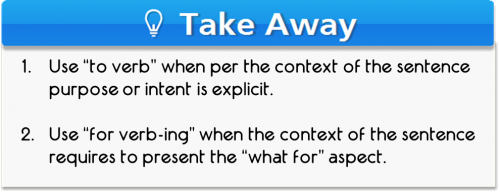‘TO VERB’ VS ‘FOR VERB-ING’

Hi folks,
Let the title of the article not confuse you. Read the following two sentences:
1. Joe wrote a book
to share his experiences with others.
2. Joe got acclaims
for writing the book.
These are very easy simple sentences and so the usage of the highlighted phrases does not bother us. Fair enough. Now let’s reverse these phrase in the above two statements.

1. Joe wrote a book
for sharing his experiences with others.
2. Joe got acclaims
to write the book.
Now these sentences certainly strike you. You immediately tell yourself, “Hey, these don’t sound right.” Right? Don’t only trust your ears or instincts. Read on to know why they don’t get grammatical approval.
REASON OUT
We must understand the usage of “to verb” and “for verb” to be able to distinguish between the contexts where these phrases can be used correctly.
Use of “to verb" – This phrase is used when we need to present the purpose or the intention of an action. This phrase is actually a shorter way of “writing” “in order to verb”. Let’s take the simple sentences with this phrase we mentioned in the beginning of the article.
1. Joe wrote a book to share his experiences with others.: This sentence correctly uses “to share” because it presents the purpose why Joe wrote the book. It is explicit from the context that Joe wrote the book because he wanted to share his experience with others.
2. Joe got acclaims to write the book.: This sentence does not use “to write” correctly because writing the book is certainly not the purpose of Joe getting acclaims.
Use of “for verb-ing” – Since “for” is a preposition, it can modify either a noun or a verb. Prepositional phrase “for verb-ing” can modify the verb or the noun in that it denotes some relation to the entity it modifies. Let’s understand this through the previously mentioned simple sentences.
1. Joe got acclaims for writing the book.: This sentence correctly uses “for writing” because this prepositional phrase logically modifies the verb “got”. Here, there is no question of presenting any purpose. The sentence rather explains “what for” Joe got acclaims. Hence, use of “for writing” is correct.
2. Joe wrote a book for sharing his experiences with others.: This sentence incorrectly uses “for sharing” to denote Joe’s intention of writing the book.
So, when the intention is explicit from the context of the sentence, then we must choose “to verb” over “for verb-ing”. Let’s see and evaluate the usages of these phrases in official examples.
OFFICIAL EXAMPLES – TO VERB
EXAMPLE 1
Although this is not a heavily tested concept on GMAT, this is certainly one of those concepts that confuse a lot of test takers. In such questions, generally we can narrow down our selection to two choices – one having “to verb” and the other “for verb-ing”. For example:
Warning that computers in the United States are not secure, the National Academy of Sciences has urged the nation to revamp computer security procedures, institute new emergency response teams,
creating a special nongovernment organization to take charge of computer security planning.
A. creating a special nongovernment organization to take
B. creating a special nongovernment organization that takes
C. creating a special nongovernment organization for taking
D. and create a special nongovernment organization for taking
E. and create a special nongovernment organization to take
MEANING ANALYSIS:The NAS has warned that the US computers are not secure. Hence, they have urged the nation to do a few things.
PoE:We are not doing the Error Analysis here because those errors do not encompass the topic of discussion of this write-up. After error analysis, we can narrow our choices to D and E. The only difference between these two choices is “for taking” and “to take”. So let’s analyze these choices:
D. and create a special nongovernment organization for taking: From meaning analysis we know that the NAS has asked the US government to do a few things to secure its computers. One of these tasks is to create a special nongovernment organization.
Now, per the context of the sentence, it is clear that taking charge of computer security planning is the purpose for creating this special nongovernment organization. Hence, purpose is explicit from the context. So this choice stands
incorrect as it uses “for creating” instead of “to create”.
E. and create a special nongovernment organization to take: This choice correctly expresses the purpose by using the correct phrase “to create”, and hence is the
correct answer.
EXAMPLE 2
The same usage can be seen in OG13#76.
Combining enormous physical strength with higher intelligence, the Neanderthals
appear as equipped for facing any obstacle the environment could put in their path, but their relatively sudden disappearance during the Paleolithic era indicates that an inability to adapt to some environmental change led to their extinction.
ERROR ANALYISOne of the errors in the sentence is the use of “for facing”. The context of the sentence tells us that the Neanderthals were equipped with the purpose of doing something. And what is this purpose? The purpose was facing any environmental obstacle. Since the purpose is explicit here, we should use “to face” and not “for facing”
Following is the sentence with correct answer choice:
Combining enormous physical strength with higher intelligence, the Neanderthals appear to have been equipped to face any obstacle the environment could put in their path, but their relatively sudden disappearance during the Paleolithic era indicates that an inability to adapt to some environmental change led to their extinction.
This choice corrects that error and changes “for facing” to “to face” to correctly express the explicit purpose in the sentence.
OFFICIAL EXAMPLES – FOR VERB-ING
EXAMPLE 1
New genetic evidence - together with recent studies of elephants’ skeletons, tusks, and other anatomical features -
provide compelling support for classifying Africa’s forest elephants and its savanna elephants as separate species.
A. provide compelling support for classifying
B. provide compelling support for the classification of
C. provides compelling support to the classification of
D. provides compelling support for classifying
E. provides compelling support to classify
MEANING ANALYSIS:The sentence says that New genetic evidence together with some other things provide compelling support. Support for what? Support for classifying Africa’s forest elephants and savanna elephants as separate species.
PoE:Again, the error analysis helps us eliminate the first three choices for errors we are not discussing here. Again the only difference between D and E is “for classifying” and “to classify”.
D. provides compelling support for classifying: Per the meaning, new genetic evidence provides support. Most certainly, the new genetic evidence does not have any purpose for providing such support. Rather we can ask what is this support for? This support is for doing something else. Hence this choice
correctly uses “for classifying”.
E. provides compelling support to classify: This choice is clearly incorrect because there cannot be any purpose here per the context of this sentence.
P.S: Also, this sentence involves usage of correct idiom. “provide support or help” is always followed a preposition + Noun. Hence, choice E is incorrect idiomatically as well.
EXAMPLE 2
There are many official problems in
OG the study of which can be useful to understand the usage of “for verb-ing”. Although, the sentences that I’m going to talk about in this section do not necessarily test this usage, they are useful for understanding the correct usage of the phrase.
Let’s take a look at OG12#40:
This is the sentence with the correct answer choice as the topic of discussion is not tested in this question:
Dr. Tonegawa won the Nobel Prize for discovering how the body can constantly change its genes to fashion a seemingly unlimited number of antibodies, each targeted specifically at an invading microbe or foreign substance.
This sentence correctly uses “for discovering” because Dr. Tonegawa won the Nobel prize for something. If we change “for discovering” to “to discover”, the meaning will be distorted. There is no purpose involved in this sentence and hence “for discovering…” clearly answer what for Dr. Tonegawa won the Nobel Prize.

OG QUESTIONS YOU CAN STUDY FOR CORRECT USAGE Apply these rule sets to the following
OG questions.
OG 12# 51, 106
OG Verbal Review 2# 5, 8,
EXERCISE QUESTION
While some propose to combat widespread illegal copying of computer programs by attempting to change people's attitudes toward pirating, others
by suggesting reducing software prices to decrease the incentive for pirating, and still others by calling for the prosecution of those who copy software illegally. (
OG 10)
A) by suggesting reducing software prices to decrease the incentive for pirating, and still others by calling
B) by suggesting the reduction of software prices to decrease the incentive for pirating, and still others call
C) suggest the reduction of software prices for decreasing the incentive for pirating, and still others call
D) suggest the reduction of software prices to decrease the incentive for pirating, and still others by calling
E) suggest reducing software prices to decrease the incentive for pirating, and still others are calling
Hope this helps.

Thanks.
Shraddha




![]() TO VERB’ VS ‘FOR VERB-ING’.pdf [392.22 KiB]
TO VERB’ VS ‘FOR VERB-ING’.pdf [392.22 KiB] 



